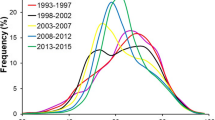Abstract
Background: The incidence and mortality of hepatocellular carcinoma (HCC) are increasing in the United States. Whether surgery is associated with improved survival at the population level is relatively unknown. To address this question, we used a population-based cancer registry to compare survival outcomes between patients receiving and not receiving surgery with similar tumor sizes and health status.
Methods: By using the Surveillance, Epidemiology, and End Results database, we identified HCC patients who had surgically resectable disease as defined by published expert guidelines. After excluding patients with contraindications to surgery, we performed both survival analysis and Cox regression to identify predictors of improved survival.
Results: Of the 4008 patients diagnosed with HCC between 1988 and 1998, 417 were candidates for surgical resection. The mean age was 63.6 years; mean tumor size was 3.3 cm. The 5-year overall survival with surgery was 33% with a mean of 47.1 months; without surgery, the 5-year overall survival was 7% with a mean of 17.9 months (P < .001). In the multivariate Cox regression, surgery was significantly associated with improved survival (P < .001). Specifically, patients who received surgery had a 55% decreased rate of death compared with patients who did not have surgery, even after controlling for tumor size, age, sex, and race.
Conclusions: This study shows that surgical therapy is associated with improved survival in patients with unifocal, nonmetastatic HCC tumors <5 cm. If this is confirmed in future studies, efforts should be made to ensure that appropriate patients with resectable HCC receive high-quality care, as well as the opportunity for potentially curative surgery.
Similar content being viewed by others
References
Di Bisceglie AM, Carithers RL Jr., Gores GJ. Hepatocellular carcinoma. Hepatology 1998;28:1161–5.
El-Serag HB, Mason AC. Rising incidence of hepatocellular carcinoma in the United States. N Engl J Med 1999;340:745–50.
El-Serag HB, Mason AC, Key C. Trends in survival of patients with hepatocellular carcinoma between 1977 and 1996 in the United States. Hepatology 2001;33:62–5.
Landis SH, Murray T, Bolden S, Wingo PA. Cancer statistics, 1999. CA Cancer J Clin 1999;49:8–31.
Giovannini M, Elias D, Monges G, Raoul JL, Rougier P. Hepatocellular carcinoma. Br J Cancer 2001;84:74–7.
Farinati F, Gianni S, Marin G, Fagiuoli S, Rinaldi M, Naccarato R. Does the choice of treatment influence survival of patients with small hepatocellular carcinoma in compensated cirrhosis? Eur J Gastroenterol Hepatol 2001;13:1217–24.
Arii S, Yamaoka Y, Futagawa S, et al. Results of surgical and nonsurgical treatment for small-sized hepatocellular carcinomas: a retrospective and nationwide survey in Japan. The Liver Cancer Study Group of Japan. Hepatology 2000;32:1224–9.
Fong Y, Sun RL, Jarnagin W, Blumgart LH. An analysis of 412 cases of hepatocellular carcinoma at a Western center. Ann Surg 1999;229:790–9; discussion 799–810434_2004_Article_298.
Lai EC, Fan ST, Lo CM, Chu KM, Liu CL, Wong J. Hepatic resection for hepatocellular carcinoma. An audit of 343 patients. Ann Surg 1995;221:291–8.
Livraghi T, Bolondi L, Buscarini L, et al. No treatment, resection and ethanol injection in hepatocellular carcinoma: a retrospective analysis of survival in 391 patients with cirrhosis. Italian Cooperative HCC Study Group. J Hepatol 1995;22:522–6.
Poon RT, Fan ST, Lo CM, et al. Improving survival results after resection of hepatocellular carcinoma: a prospective study of 377 patients over 10 years. Ann Surg 2001;234:63–70.
Vauthey JN, Klimstra D, Franceschi D, et al. Factors affecting long-term outcome after hepatic resection for hepatocellular carcinoma. Am J Surg 1995;169:28–34; discussion 34–5.
Ebara M, Ohto M, Shinagawa T, et al. Natural history of minute hepatocellular carcinoma smaller than three centimeters complicating cirrhosis. A study in 22 patients. Gastroenterology 1986;90:289–98.
Surveillance, Epidemiology, and End Results. Surveillance, Epidemiology, and End Results (SEER) Program Public-Use Data (1973–1998). National Cancer Institute, DCCPS, Cancer Surveillance Research Program, Cancer Statistics Branch, released April 2001, based on the August 2000 submission. Available at: http://seer.cancer.gov./ Web site accessed March 2002, verbal communication March 26, 2002.
Surveillance, Epidemiology, and End Results. SEER Program Code Manual. Bethesda, MD: National Institutes of Health, 1998.
LaVeist TA. Beyond dummy variables and sample selection: what health services researchers ought to know about race as a variable. Health Serv Res 1994;29:1–16.
Howard J, Hankey BF, Greenberg RS, et al. A collaborative study of differences in the survival rates of black patients and white patients with cancer. Cancer 1992;69:2349–60.
Otten MW Jr., Teutsch SM, Williamson DF, Marks JS. The effect of known risk factors on the excess mortality of black adults in the United States. JAMA 1990;263:845–50.
Fink AS, Campbell DA Jr, Mentzer RM Jr, et al. The National Surgical Quality Improvement Program in non-veterans administration hospitals: initial demonstration of feasibility. Ann Surg 2002;236:344–53; discussion 353–4.
Khuri SF, Daley J, Henderson W, et al. The Department of Veterans Affairs’ NSQIP: the first national, validated, outcome-based, risk-adjusted, and peer-controlled program for the measurement and enhancement of the quality of surgical care. National VA Surgical Quality Improvement Program. Ann Surg 1998;228:491–507.
Malin J, Kahn KL, Adams J, Kwan L, Laouri M. Validity of cancer registry data for measuring the quality of breast cancer care. J Natl Cancer Institute 2002;94:835–44.
Author information
Authors and Affiliations
Corresponding author
Rights and permissions
About this article
Cite this article
Liu, J.H., Chen, P.W., Asch, S.M. et al. Surgery for Hepatocellular Carcinoma: Does It Improve Survival?. Ann Surg Oncol 11, 298–303 (2004). https://doi.org/10.1245/ASO.2004.03.042
Received:
Accepted:
Issue Date:
DOI: https://doi.org/10.1245/ASO.2004.03.042




